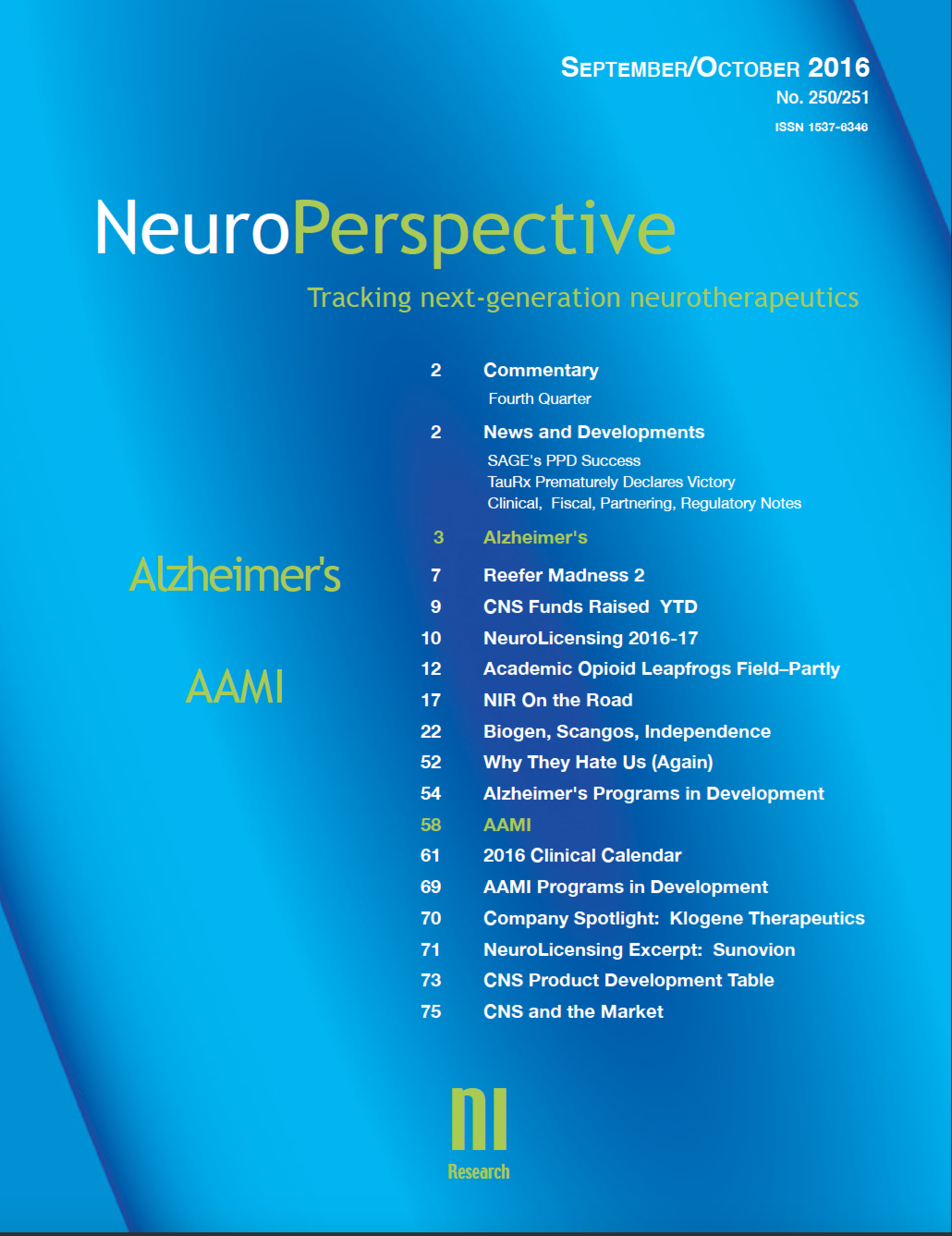NeuroPerspective has released its Winter 2026 issue, featuring our annual look back at the preceding year, and our Preview of the year ahead. 2025 was a highly productive year for several subsectors of the neurotherapeutics space, including Psychedelics, Epilepsy, Narcolepsy, and muscarinics.
The Psychedelic area has matured faster than we ever could have anticipated, both clinically and fiscally. Clinical successes were achieved by Compass, with its first PhIII in TRD; AtaiBeckley, who celebrated their 5-MeO-DMT PhII results by consummating their merger; Gilgamesh’s PhII results with bretisolicin were convincing enough to spur AbbVie into making a $900 million upfront payment to partner that program; and Reunion’s RE104 performed well in Post-Partum Depression. 2026 will see important datasets in anxiety (MindMed, Cybin/Helus, and AtaiBeckley) and depression (Compass, Atai/Beckley, Cybin/Helus, MindMed). The magnitude of reported treatment effects has been enough to galvanize institutional investment: in 2025,18.4% of all CNS investment went to psychedelics, which is remarkable. It is worth noting that, at least for now, this has taken away some of the momentum that had been building for ‘trip-free’ neuroplastogens. So far as non-psychedelic datasets in depression are concerned, we are looking forward to 2026 results from Autobahn, Alto, and Xenon.
Epilepsy has emerged as a key area for clinical advancement, particularly in terms of rare, severe pediatric epilepsies, and treatment refractory focal seizures. 2026 will see PhIII results for Lundbeck/Longboard, Xenon, Praxis, and
Biohaven, with key data coming next year for Biogen/Stoke and Neurvati.
Narcolepsy treatment will see a basic paradigm shift as orexin-2 agonists come online, first in NT1 from Takeda, followed by Alkermes, Centessa, and eventually, Harmony.
While BMS’ Cobenfy has been slow to ratchet up its sales pace, partly reflecting its failure in an adjunctive trial, Maplight was able to raise over $600 million to advance its M1/M4 agonist program, with topline CIAS results coming before year-end, Neurocrine is in PhIII with their M4 activator, Neumora and others are earlier on with their muscarinic candidates. Using a nonmuscarinic mechanism, Kynexis will have topline results from a well-constructed PhII in CIAS before the end of 2026.
On the downside, the failure of GSK/Alector’s latozinemab in FTD-GRN was a sobering reminder that, even with the advantages of a genetically defined subgroup, a reasonable mechanistic rationale, and a relevant biomarker, disease modification in neurodegeneration is never guaranteed. This must have quickened the anxiety for other companies with progranulin-boosting programs, and PhII results will come this year for Takeda/Denali, Passage Bio, and Astellas. There was remarkably little progress made in Alzheimer’s, other than the incremental improvement in ease-of-use provided by subQ options for amyloid mAbs: Several companies, including Roche, Denali, AbbVie,
Acumen, and Novartis, have invested in BBB-transit technologies, but to the extent to which these brain ‘shuttles’ are used to ferry amyloid antibodies, there is reason to doubt that removing plaque faster will make an appreciable difference in therapeutic effect. While another tau mAb failed in 2025 (JNJ), 2026 will see midyear data for Biogen/Ionis’ MAPT ASO PhII, and BMS will have AD-psychosis results for Cobenfy by year-end. But the failure of Novo Nordisk’s large studies of semaglutide in AD serve as a reminder that PhII should not be skipped on the way to running 3600 patients through PhIII.
From a macro-financing perspective, while 2025 saw an 11% YTY reduction in fiscal resources provided to small-midsize CNS companies, it was still the fourth best year since 2009, and there was a healthy uptick in financings, including IPOs, during the last quarter of the year. And the acquisition of Intra-Cellular Therapies by JNJ was a reminder of the heady rewards that can result from taking developmental risks with an inhouse program.
Among the 150+ companies with coverage in this issue are AbbVie, Acadia, Acumen, AC Immune, Alkermes, Actinogen, Alector, Alto, Alzamend, Anavex, Aspen, AtaiBeckley, Autobahn, Axsome, BioArctic, Biogen, Biohaven, BMS, Boehringer Ingelheim, Compass, Cybin/Helus, Eisai, Gilgamesh, GH Research, GSK, JNJ, Kynexis, Lilly, Lundbeck, Maplight, Merck,MindMed, Muna, Myrobalan, Neumora, Neurocrine, Neurvati, Novartis, Oryzon, Otsuka, Praxis, ProMIS, Prothena, Rapport, Resilient, Reunion, Roche, Sanofi, Seaport, Syndeio, Syremis, Takeda, Vesper, UniQure, and Xenon.
The Psychedelics
Update section appraises the impact of the AbbVie/Gilgamesh partnership upon Pharma ‘hallucinophobia’, the failure of microdosing, the dimming prospects for neuroplastogens, and notes the robust treatment effects achieved by multiple psychedelic assets.
As always, there is coverage of significant clinical, fiscal, and partnering events. 40 pages.
NeuroPerspective is the quarterly review of the neurotherapeutics area offering essential, unique, and comprehensive coverage of developments in the science and the business of the CNS sector. A one-year (1-5 user) subscription is $3400. A 6-10 user subscription is $5600. Other customized user base and startup pricing options are available. The Winter issue is available as a single issue purchase, US$900.
Read More
